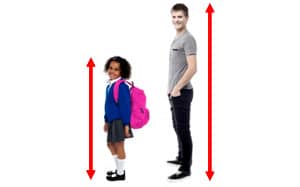Comparing things that are equal
“as” + adjective + “as”
Jane is as tall as John.
(Jane and John are the same height)

David is as intelligent as you.
(David and you have the same level of intelligence.)
My car is as nice as yours.
(My car and your car are of the same quality.)

Comparing things that are not equal
“not as” + adjective + “as”
Jane is not as tall as John.
(Jane is shorter than John.)

David is not as intelligent as you.
(David is less intelligent than you.)
My car is not as nice as yours.
(My car is less nice than yours.)

Comparing actions that are equal
“as” + adverb + “as”
He is running as quickly as her.
(They are both running at the same speed.)

Mark studied as hard as me.
(Mark and I studied for the same amount of time and with the same effort.)
Jane sings as well as David.
(Jane and David have the same level of singing ability.)
Comparing actions that are not equal
negative form + “as” + adverb + “as”
He is not running as quickly as her.
(He is running slower than her.)
Mark did not study as hard as me.
(Mark studied less than me.)
Jane doesn’t sing as well as David.
(David sings better than Jane.)
Expressions of possibility with “as soon as”
“as soon as possible“
=at the earliest possible time.
Example:
Send me the email as soon as possible.
“as soon as” + subject + “can“
Example:
Call me as soon as you can.
=at the earliest possible time for you. (present tense)
“as soon as” + subject + “could“
Example:
My parents came as soon as they could.
=at the earliest possible time for my parents. (past tense)
Comparing the quantity of things
Comparing the quantity of countable nouns
“as many” + countable noun + “as“
Situation: Mark has 3 phones and Jane also has 3 phones. We can say:
Mark has as many phones as Jane.
= Mark and Jane have the same number of phones.
“as many” + countable noun + “as possible”
Example:
I want to visit as many countries as possible.
(=I want to visit the maximum number of countries that is possible.)
“as many” + countable noun + “as” + subject + “can” / “could”
Example:
She ate as many cakes as she could.
=She ate the maximum number of cakes that was possible for her. (past tense)
Comparing the quantity of uncountable nouns
“as much” + uncountable noun + “as“
Example 1:
Mark has as much water as David.
= Mark and David have the same quantity of water.
Example 2:
Mark earns as much money as Jane.
=Mark and Jane earn the same amount of money.
“as much” + countable noun + “as possible”
Example:
Please give me as much information as possible.
= Give me the maximum amount of information that is possible.
Other lessons
IELTS online lessons, preparation and writing corrections
Practise your English speaking
Comparative adjectives
Superlative adjectives
English suffixes
Adjectives ending in ING and ED
List of all the English lessons

